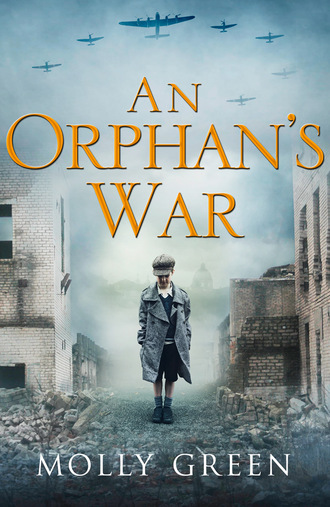
Полная версия
An Orphan’s War
It was hard to push Johnny to the back of her mind and care for her patients. Injured men and women were coming into the hospital every single day, and every time she dreaded it would be Johnny they brought in on a stretcher. She was still convinced he was in Dunkirk and hadn’t been rescued and tried to ask around on how she could find any information but no one seemed to have any idea.
‘You could try the Red Cross,’ Sister Marshall suggested when she came across Maxine in tears one day in the nurses’ room. ‘They are the ones who send information to families when British soldiers are injured …’ she hesitated, ‘or dead. I think they’d be your best bet.’
But she had no luck there either. Until a fortnight later when she received a letter from them. With a lump in her throat, she read:
Dear Mrs Taylor,
We are very sorry to inform you that your husband, Cpl. John L Taylor has been taken prisoner by the German Army at Dunkirk. He bravely volunteered to remain so he could attend to his wounded comrades. When there is more news we will, of course, let you know.
Yours sincerely,
Mary Jackson (Mrs)
Welfare Officer
Maxine swallowed hard, trying to dislodge the lump. She was right. He had been sent to Dunkirk. Dear Johnny. Whatever must he have felt, seeing the ships rescuing thousands of soldiers and he wasn’t one of them. But it seemed he’d made the decision, just as she expected he would. Maxine felt a sting behind her eyes. Yes, he was brave, and she could well imagine him doing just that.
Another agonising fortnight passed with no more news. Maxine was in the ward helping a patient to walk to the toilet, grateful that she was a slight woman, though she still weighed heavily on her arm, when Sister Marshall came up to her, a look of concern in her eyes.
‘I’ll take Mrs Harvey, Nurse. There’s a telegram for you in Matron’s office.’
She knew. Cold sweat beaded her forehead. She didn’t even have to open the telegram. She reprimanded herself. Until she heard otherwise she mustn’t crumple. Mustn’t think the worst. It might be him and he was writing to say he was safe. But she knew any form of contact from him would not be in the form of a telegram.
With hammering heart she half ran down the corridor.
‘Nurse!’ A Sister she didn’t know held her hand in the air. ‘I must remind you – you may only run for fire or haemorrhage.’
‘I’m sorry, Sister.’
Her feet now feeling like lead, she knocked on Matron’s door.
‘Come in.’ Matron looked up. ‘Oh, yes, Nurse Taylor. Do sit down.’
Maxine’s knees felt they would give way at any moment. Defeated, she sat and caught her breath.
‘A telegram has arrived for you.’ Matron handed her a blue envelope.
With trembling hands Maxine took the telegram. Even before she saw the word ‘priority’ written on the envelope, she knew …
‘If you’d like to take a moment and read it quietly, I’ll leave you to it.’ Matron disappeared out of the door. ‘Call me if you need me. I won’t be far away.’
Her fingers could barely work under the seal to open it. Heart pounding in her throat, she pulled out the sheet of paper with the printed message.
From Lieutenant-Colonel J. A. Donaldson
6th July 1940
Dear Mrs Taylor,
May I be permitted to express my sincere sympathy with the sad news concerning your husband Cpl. John L Taylor. I regret to say that we have been notified today via the Swiss Red Cross of his death from pneumonia.
Your husband was an exemplary soldier and his loss is deeply regretted by us all.
When we receive any of his effects they will be forwarded on to you.
Once again please accept the deep sympathy of us all.
Yours very sincerely,
J. Anthony Donaldson
The paper fluttered to the floor. Maxine couldn’t summon the energy to bend down and pick it up. A terrible shaking took hold of her body. She dropped her head in her hands, gasping to hold back the sobs. She mustn’t break down. She needed to look after her patients. They relied on her.
She heard the door open and the solid figure of Matron step in.
‘Oh, my dear … it’s bad news, isn’t it?’
Maxine nodded, speechless.
‘Your husband?’
‘Yes.’ It was a whisper.
‘I’m sending you home right away. Take two days off.’
‘Oh, I couldn’t …’
‘We’ll manage, if that’s what’s worrying you.’ Matron put a hand on her shoulder.
She looked up. Matron’s face was creased in sympathy.
‘Please let me go back to the ward, Matron.’ Maxine forced herself to speak calmly. ‘I’ll be better if I can work. I’ll have plenty of time to think about it when I’m off-duty.’
‘Very well.’ Matron became brisk. ‘But I insist you go to the canteen and have a strong cup of tea with sugar. You’re in shock, my dear, though you may not realise it. And if you are not feeling better tomorrow, please stay at home.’
Somehow she got through the day, even forgetting for a few minutes at a time about the telegram and the terrible news. And then it would sweep over her in a sickening cloud. Johnny – her dearest friend since childhood. She would never see him again. Never look into his twinkling brown eyes. Never laugh at his feeble jokes.
She delivered the last bedpan to an elderly lady who reminded her of her headmistress. A hard-faced woman with frizzy grey curls and bitter lines around her mouth, who was furious to be forced to use such an item for her private ablutions.
Maxine pulled the curtains around the patient and tucked the bedpan under the cover. ‘There you are, Mrs Shepherd. I’ll be back shortly.’
‘See that you do, Nurse.’ Mrs Shepherd looked at Maxine with reproachful eyes, as though it were her fault. ‘I waited a full quarter of an hour this morning before someone came to take it away.’
That evening, Maxine stepped into the hall and her mother came out immediately, her face red, all of a fluster.
‘My dear, was it bad news?’
Maxine felt caught off guard. How did her mother know something had happened before she did?
‘The telegram boy brought it here and I told him you were at the Infirmary.’ She took her daughter’s coat and hung it on the rack. ‘It’s Johnny, isn’t it?’
‘Let me tell you and Dad together, Mum.’
‘I’d better make us all a cup of tea.’
A brandy would be more like it, Maxine thought, but she simply nodded and her mother disappeared into the kitchen.
She found her father in his chair in the sitting room reading his newspaper, glasses slipping down his nose, his favourite slippers with a hole in each toe encasing socks which she’d had to snip the tops off to make room for his poor swollen ankles. He rose up with difficulty and gave her a hug.
‘Your mother says a telegram came here for you, but she sent the boy to the hospital.’
‘It’s very bad news,’ Maxine began as her mother appeared with the tea tray. She felt the tears prick at the back of her eyes. She must keep calm. Must let them know she was being sensible and not acting impulsively. ‘Johnny’s dead.’ There was no other way to say it.
Her mother’s hand flew to her mouth. ‘I knew it … I just knew it. As soon as he’d been taken by those dreadful Germans. Didn’t I tell you, Stan?’
Her father gave a long sigh. ‘Yes, you did, dear.’ He turned to his daughter. ‘And I’m very sorry to hear it, Maxine. He was a good lad and thought the world of you. Did they give you any details?’
‘Yes.’ Maxine’s voice was almost a whisper. ‘Pneumonia.’
‘Oh, the poor boy.’ A tear spilled down her mother’s cheek. ‘Well, at least you’ve got us. We’ll look after you at home and help you through.’
‘Thanks, Mum, and I really mean it, but I’ve decided to apply to St Thomas’.’
‘You’re not going on about moving to London again?’ Her mother’s eyes were wide. ‘You don’t want to make a decision as important as this without more time. You’ve had a terrible shock, dear, and you’re not thinking straight.’
‘I am, Mum. Everywhere I look around here reminds me of Johnny—’ She broke off, her voice trembling. ‘I must go and see his parents. They’ll be heartbroken … their only son. Oh, it’s not fair. It’s just not fair.’
Her eyes swimming, she banged her cup on its saucer and rushed out of the room, but not before she heard her father say, ‘Leave her be, Edna. She’s old enough to make her own decision. The change is probably just what she needs to take her mind off things.’
Maxine heard back from St Thomas’ within a few days. They were interested! Because of the war, provided she had references from the hospital, they weren’t going to waste time interviewing her. There was a desperate shortage of nurses so they would like her to start as soon as she could give in her notice. They had every reason to believe that her initial training at the Royal Infirmary was first class and that she’d be a real asset at St Thomas’ as a nurse at their Nightingale School for the next two years. Would she let them know by return that she was still interested so they could prepare her paperwork?
It had happened. One letter to the hospital had led to her life changing – but only because her dearest Johnny had died. She swallowed. She was determined to do her best in this war, whatever the cost. She owed it to him.
As soon as she had given in her notice, Sister said in view of the circumstances she could leave as soon as she was ready. A fortnight later the arrangements were in place. And then it was her last day. Maxine had said her goodbyes to the other nurses and patients and as she was about to leave by the staff door, Sister Dugdale stopped her and put a small package in her hands.
‘From all of us on the ward,’ she said. ‘You’ve worked hard,’ she continued, her voice as crisp as her cap and apron. ‘The makings of an excellent nurse so long as you don’t get carried away with your emotions. It’s difficult, I know … perhaps the most difficult, but it’s vital you don’t get personally involved with individual patients to the point where you can’t do a professional job.’
Maxine knew Sister was referring to Robin, only six, on the children’s ward. The child had been run over in the blackout and they said his injuries were so bad he probably wouldn’t survive. But he had. Maxine had been determined that he would pull through. His parents were constantly at his bedside, but when they left for the day she would talk to him, give him sips of Lucozade, read to him. Her reward was that he slowly recovered and her favourite time of the day was when she came on duty and his face lit up in a beaming smile. She could have hugged him to bits. Three days before his discharge she’d come on duty to find his bed freshly made up.
‘Have they already sent Robin home?’ she’d asked, happy that the day had come, but disappointed she hadn’t been there to say goodbye.
There was a few seconds’ silence. A tension in the ward. Maxine looked at Fuller and White, the two other nurses. Then Fuller said in a low voice, ‘He died in the night.’
She’d run to the toilets and sat on the seat, sobbing her eyes out. Eventually she got up and combed her hair and arranged her cap. She looked terrible. Eyes puffy and red. Sister was sharp with her, and she thought at the time what a hard woman Sister was. But experience taught her differently. Sister was right. She probably didn’t have the perfect temperament to be a nurse, but she’d do her level best, especially now they really were at war. And if one day she could become a children’s nurse, it might be her salvation.
The night before Maxine left home for London there was something she needed to do. She knew it would take all her courage.
‘I think I’ll have an early night,’ she told her parents after the three of them had spent an awkward evening in the front room, none of them knowing quite what to say.
‘I don’t blame you, love.’ Her father smiled sympathetically, his eyes full of affection. ‘You’ve got a big day ahead of you tomorrow, and an early train to catch.’
‘I’ll say goodnight then.’
In her bedroom Maxine reached for the top shelf in her wardrobe and removed a shoebox, laying it on the bed. She lifted the lid to reveal Johnny’s letters in a neat pile – and a navy blue ring box. She took the ring box out, then gently removed her engagement ring, remembering when Johnny had first slipped it on her finger. Emeralds were said to be unlucky and it had turned out to be true, she thought sadly.
‘Goodbye, Johnny,’ she spoke aloud, the words almost choking her. ‘I’ve loved you since I was eight, but I must leave you now to rest in peace.’
With tears streaming down her cheeks, she kissed the ring and pressed it in its slot. The lid made a final snap as she closed it and laid the little box on top of Johnny’s letters. Satisfied, she slid the shoebox back on the shelf in the wardrobe. The ring would be safe there.
Chapter Five
London, July 1940
As Maxine hurried over Westminster Bridge, she tilted her head skywards to the faint sound of a plane, but there was nothing in sight except two contrails crisscrossing a flight path. The Battle of Britain had started a few days before, raging over Kent and the coast. Her mother had begged her to stay in Liverpool, but stubbornly she’d kept to her plan. Hardly giving the Thames more than a cursory glance, Maxine paused a moment on the bridge to check the folded letter in her hand. Yes, St Thomas’ was directly opposite the Houses of Parliament.
A few minutes later she passed through the imposing front entrance of the red-brick hospital. No sooner had she stepped in and given her name at the front desk than a tall, thin woman with a blue and white uniform which crackled when she walked marched up to her. There was no smile of welcome and Maxine’s heart plummeted.
‘Taylor, I presume. I’m Sister Dawson, standing in today for the Home Sister, Miss Harley. We’re expecting you. In fact,’ she made a play of looking at the watch on her chain, ‘you’re half an hour late. I believe we said three o’clock.’
This wasn’t a good beginning. Maxine was certain she was no more than five minutes late, but it wasn’t the time to argue.
‘I’m awfully sorry, Sister,’ she said. ‘The train stopped even more times than usual, and I don’t know London all that well so I got a bit confused.’
‘Hmm.’ The woman tossed her head in disbelief. ‘You couldn’t have a much better landmark than Big Ben.’ She looked Maxine up and down, her lips tightening as though to say that Maxine wouldn’t do at all. ‘Well, you’d better come with me and I’ll show you your room. You’ll be in the West Wing – that’s where the second- and third-year nurses live.’
Maxine followed her down long, gloomy corridors with so many twists and turns she had no idea which direction she was going. Finally Sister opened one of a dozen identical doors.
‘You’ll be sharing with Nurse Redding.’ She glared at Maxine. ‘And no smoking. That’s an order.’
‘I don’t smoke,’ Maxine said, feeling like a probationer instead of a second-year nurse.
‘Be in my office in ten minutes,’ Sister Dawson ordered, closing the door with a loud click.
Maxine sat on the furthest bed, where the area didn’t appear to be occupied, and looked around. Except for a photograph and a book on the other bedside cupboard, and a cape flung over a chair to show some sign of life, the room was as gloomy as the corridors. The bedspread was a khaki colour and the curtains weren’t much fresher looking. Even though it was still July the room felt cold. She shivered and unpacked her case, hanging up the few pieces on the wooden hangers provided in the shallow cupboard next to the other nurse’s clothes, and berating herself. She’d made completely the wrong decision but there was simply no going back; she’d have to live with it. She only hoped the other nurse would be nice.
Slowly Maxine unpacked her small case and undid the little parcel Sister Dugdale had given her. It was a small green Bakelite clock. She immediately wound it up and placed it on the bedside table. Somehow, its friendly little face and cheerful sound of ticking made Liverpool seem not quite so far away.
Suddenly the door opened and a slim young nurse, short in stature, with dark curls, her cap slightly askew, stood in the doorway smiling.
‘Oh, good, you’ve arrived.’ She came in and quickly closed the door behind her, then thrust out her hand. ‘I’m Anna Redding. Welcome to the fray.’
‘Maxine Taylor.’ She took Anna’s warm, strong hand in hers.
‘I hate all this surname business even when we’re off-duty,’ Anna said, ‘and I think we’re going to be great pals, so let’s always call one another Maxine and Anna. What do you think?’
‘I’d really like that,’ Maxine said sincerely. It was a long time since she’d had a proper girlfriend, and now that Johnny … She wouldn’t allow herself to finish that thought.
‘Have you been assigned a ward yet?’ Anna asked.
‘No. I’ve got to see Sister Dawson right away. I expect she’ll tell me … or rather order me.’
‘That’s Dragon Dawson to a tee,’ Anna laughed, her hazel eyes sparkling mischievously.
‘Perfect name,’ Maxine chuckled, as she opened their bedroom door.
‘Good luck!’ Anna called. ‘And see you later in the canteen.’
Maxine’s first day began at 7.30 on the dot in Women’s Surgical with the Staff Nurse greeting her, ‘Oh, not another new one. I’d hoped I was getting someone with experience.’ She looked Maxine up and down and pursed her lips. ‘I suppose you’ll have to do. We’re extremely busy, so buck up and set to. The doctors will be doing their rounds at nine and everything has to be spotless.’
Nothing Maxine had done had been right. She was spending too much time with one of the patients, Mrs Roberts, who had undergone the removal of her childbearing apparatus and could not stop crying; she’d missed a piece of fluff under the bed when she’d mopped there; she’d been about to give the wrong tablets to one of the patients with the same surname as the lady in the far corner … By the time Staff Nurse reluctantly said she could have her long afternoon break, Maxine was almost in tears.
‘Two hours and not a minute longer. And before you ask – you’ll finish at eight this evening.’
Maxine assured her she’d be back in the ward promptly.
In the canteen, she grabbed a bowl of soup and spied Anna waving for her to sit at her table.
‘Good,’ Anna said approvingly, looking at Maxine’s bowl. ‘I chose the soup to be fast as well. Let’s hurry and then we can go to the park and have a natter – get out of this racket for an hour. I’ve done nothing but change beds and clean lockers and give out and empty bedpans this morning in Men’s. Ugh!’ She pulled a face, making Maxine laugh. ‘And what have you been up to?’
‘Nothing any more exciting than you,’ Maxine admitted. ‘The worst part is the Staff Nurse.’
‘Jenkins?’
Maxine nodded.
‘She’s a tartar. Only been here a month and wants to exercise her authority. Don’t take any notice. Keep your head down and you’ll be all right.’
The afternoon was even worse. Maxine had to sit at a table with two trainees and stitch sanitary towels. She thought she would scream with boredom, and the two young nurses looked equally fed up.
‘Push that mop of yours right under your cap, Baker,’ the Staff Nurse admonished one of them, a girl with beautiful red curls, as she swept by. ‘You look like someone on the stage.’ She hesitated and looked at Maxine. ‘And you, Taylor, I need you to do the rest of the blanket baths we didn’t get round to this morning because you spent too long chatting to the patients.’
Maxine bit back a retort.
That night in bed, tired out though she was, Maxine tossed and turned. A few feet away she could hear Anna’s regular breathing. How she envied her new friend. All she could think about was Johnny. Johnny dying, with no one to hold his hand. She began to cry, softly at first, and then her body racked with her sobs, and her tears drenched the thin, flat pillow.
She sensed, rather than saw, Anna leap out of bed and rush towards her. A hand stroked her hair.
‘Don’t cry, Maxine. The first few days are always the worst.’
‘It’s not that.’ Maxine’s voice was muffled in her pillow.
‘What is it then? You can tell me. I’m a good listener.’
Maxine struggled to sit up, tears still falling. ‘You don’t want to hear all my woes. Everyone’s got troubles at the moment.’
‘Let’s make a pact right now,’ Anna said. ‘We’ll always trust one another to be able to say whatever is troubling us. Me, as well as you.’ She stuck her hand out. ‘Come on, shake hands.’
Maxine put out a trembling hand and Anna took it in her own warm one.
‘Now, tell me what’s the matter. It’s bound to be a man, isn’t it?’
Maxine nodded. ‘I’ve lost my best friend.’ She squeezed Anna’s hand without realising. ‘He … Johnny … I’ve known him since we were children and now he’s dead.’ She lowered her head as she broke into sobs.
‘What happened?’ Anna gently touched her shoulder.
‘He was taken prisoner at Dunkirk, and then he died of pneumonia.’
Anna produced a handkerchief. ‘Here, blow your nose.’ Maxine blew. ‘It’s horrible. Women losing their men because of that rotten little man with his ridiculous moustache.’
Maxine turned her head to see Anna’s own eyes fill. ‘You sound like you’ve lost someone too.’
‘My dad.’ Anna’s voice was flat. ‘He was a fireman and he’d just rescued a family from a burning building and then … a piece of burning timber fell on him, killing him instantly.’
‘Oh, Anna, I’m so sorry.’
‘But we’re not talking about me,’ Anna said firmly, ‘and it sounds trite, but the pain does lessen with time.’ She looked sharply at Maxine. ‘Did you fall in love with your Johnny when you were adults, by any chance?’
‘I loved him deeply, but I’m not sure I was in love with him,’ Maxine admitted. ‘But he persuaded me to marry him because of the war.’
Anna’s eyebrows shot up. ‘Oh, my goodness. I should have realised – you’re wearing a wedding ring. So you’re now a widow?’
‘I was married such a short time I hardly felt married, let alone widowed. I just feel a horrible black hole where Johnny ought to be.’
‘Bugger this war,’ Anna said, hugging her. ‘No one can ever take the place of anyone, but I’ll do my damnedest to be the best friend ever. You’re not alone now. You’ve got me. Just remember that.’
Chapter Six
September 1940
If it hadn’t been for Anna’s kindness, making sure she wasn’t left alone on her time off, and cheering her up with her impersonations of some of the senior staff, Maxine didn’t think she would have made it through those first difficult weeks grieving for Johnny and feeling guilty for leaving her parents. But Anna, it seemed, refused to let anything get her down – not the notorious Sister Dawson who did her best to make the second-year nurses’ lives as miserable as she possibly could, nor the complaining patients, nor the horrific injuries they were constantly faced with. And after her first month, with Anna’s support, Maxine began to feel she might be a very small but worthy cog in the very large wheel that was St Thomas’.
At the start of the month she was sent to Female Chronic where the patients were mostly grannies who’d been put in cot-beds until they died. There was little to amuse them – they only lived for their sons’ and daughters’ visits that were all too brief, the grown-up children needing to get back to their own families before the blackout. Maxine felt sorry for the elderly patients, as many of them were having one-sided conversations with long-departed relatives. Most days Mrs Jason conversed happily with her son who’d fallen in Flanders. Afterwards she would dissolve in tears and Maxine would sit with her and hold her hand, letting her ramble on, even though she knew she would be reprimanded for wasting time if Staff Nurse walked in. The old lady’s only other bright moment was her nightly Ovaltine.






